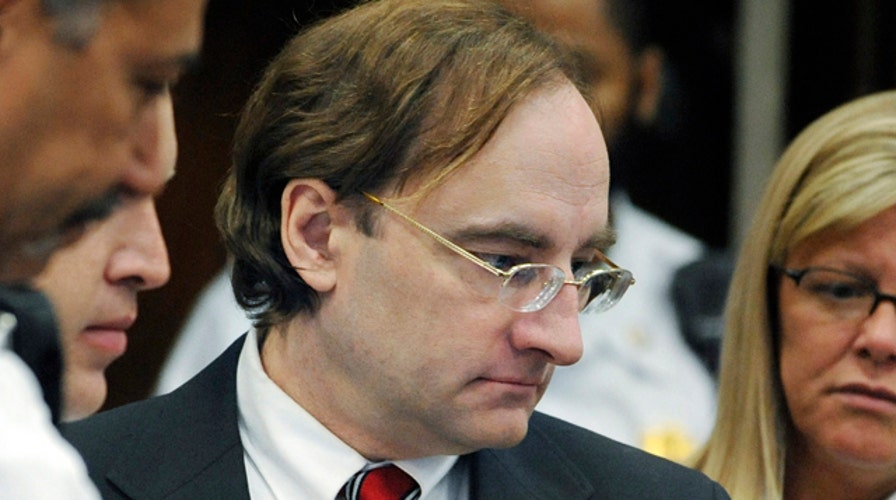LOS ANGELES – To his neighbors in an upscale Pasadena suburb, he was the man from nowhere, a newcomer who joined the church, ingratiated himself to elderly residents and called himself Chris Chichester.
They invited the stranger into their homes in San Marino, shared dinners with him and thought of him as a friend.
But he seemed to have no past and, when he suddenly vanished, it left everyone puzzled. The town folks didn't immediately connect him with the disappearance of two other residents, Linda and John Sohus, who lived in the house where Chichester was a tenant.
That was 1985, the start of a wide-ranging odyssey across America for the man who would also call himself Christopher Crowe, Chip Smith and, most notoriously, Clark Rockefeller, a pretender to the fabled oil fortune.
Now he has another identity, his birth name: Christian Karl Gerhartsreiter (GAYR'-hahrtz-ry-tur), a German immigrant who is charged with murder in one of the most bizarre cold cases to hit the district attorney's office in years.
Already serving time for the kidnapping of his young daughter in a Boston custody dispute, Gerhartsreiter was close to the end of his sentence and headed for freedom when the murder charge changed that. After a quarter century, authorities believed they had linked him to the disappearance of his old neighbor, John Sohus.
His trial, set for opening statements this week, will write the most important chapter in his colorful story, determining if he walks free or spends his life in prison.
"He is upbeat and he's looking for closure," defense attorney Jeffrey Denner. "He's been in limbo with this case for so long. Of course he'd like it to be resolved in his favor."
He is charged with murdering Sohus, a 27-year-old computer programmer who was linked to bones unearthed from the backyard of the home where he lived and Gerhartsreiter was a tenant. No trace has been found of Sohus' wife, Linda.
The prosecution is based on the bag of bones, traces of blood found in the cottage where Gerhartsreiter lived and the admittedly fuzzy memories of long ago acquaintances. It is a classic cold case.
Whether the highly circumstantial evidence will convince a jury remains to be seen. Deputy District Attorney Habib Balian said after a preliminary hearing that "the age of the case poses some challenges," but he's confident of a fair verdict.
Gerhartsreiter has pleaded not guilty and his lawyer said he expects him to be exonerated.
"It's our position that the state of California cannot prove that the defendant killed John Sohus," said Denner.
A questionnaire submitted to prospective jurors last week asked whether they could convict someone of murder without a motive. No one has suggested why Gerhartsreiter would have wanted to kill Sohus, the son of his landlady.
"Do you believe that every action that a person takes is done for an obviously identifiable reason?" the questionnaire asked.
Motive is not legally required for a murder conviction, but jurors often want to know the reason for a killing.
Denner and his partner, Brad Bailey, who practice in Boston and represented Gerhartsreiter in his kidnapping case, still refer to the defendant as "Rockefeller."
"When we met him in Boston, that's the name we knew him by," said Denner. "He had lived with that name for about 20 years."
During his preliminary hearing last year, he asked to be called Clark Rockefeller in court, but a judge refused.
Once, during an interview with authorities, Gerhartsreiter referred to himself as "a pathetic nothing." But his personas allowed him to live a life that belied that statement.
This impostor wormed his way into high society and talked his way into important jobs. He married a wealthy woman but his identity unraveled when he kidnapped their daughter during a custody dispute.
When he was unmasked, he became the subject of magazine articles, true crime books and TV movies that sought to explore his bizarre story and get to the heart of the man behind the pseudonyms. Who was Clark Rockefeller?
The resulting publicity led California authorities to revisit the Sohus disappearance. They realized the man in custody in Boston was not an heir to the Rockefeller fortune but was the man who had lived in San Marino decades ago. But was he a murderer?
Twelve jurors in Los Angeles Superior Court who will answer that question will start hearing evidence in the case this week.


